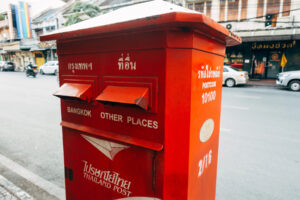Thailand (ประเทศไทย) does not have a nationwide integrated waste management and recycling system, but that doesn’t mean that all hope is lost. From separating trash and composting piles and upcycling plastics and household appliances, with a bit of effort, you can reduce your ecological footprint in no time.
Here’s what you need to know about the topic:
The recycling system in Thailand
Recycling (การรีไซเคิล) in Thailand is an interesting topic, as it is one of the countries where – until very recently – the rest of the world sent their trash. Recycling plants in this and other Southeast Asian countries dealt with recyclable trash from places like the US, European Union (EU), and Japan. That stopped, however, in 2021 when Thailand banned imports of plastic trash.

Unfortunately, the fact that Thailand used to deal with other countries’ trash doesn’t mean it’s great at managing its own. The country is the sixth-largest contributor of plastic waste in the ocean, with only 21% of plastics being recycled in 2022. An estimated 11% of plastic wasn’t even collected due to a lack of easily accessible garbage collector services.
The figures for recycling aluminum cans are more optimistic, with an estimated 90% getting recycled. This could be because aluminum cans are worth much more than plastic when they are sold, and they are collected by so-called scavengers (คนเก็บขยะ).
Private money-making companies are responsible for much of the recycling in Thailand. They arrange for regular trash pickups from residential areas. Some municipalities ask you to separate recyclable items from regular trash. In these areas, you can see the different colored garbage cans for specified types of waste, while in other areas, you can drop them at a recycling center.

Local expert
Jane Evans
Insider tip
Be mindful of those who sift through garbage when you dispose of sharp or hazardous items that could cause an injury, such as skewer sticks or pieces of glass. For example, you can wrap such things together and ensure the sharp ends are tucked into something.
Monthly garbage collection costs are usually between ฿20-80. In Bangkok (กรุงเทพมหานคร), households pay an extra fee if they fail to separate their trash first.
You can go to your district or municipality office to see how your area manages recycling and trash management. Alternatively, you can speak to your neighbors or landlord about the process.
What happens to recycled materials?
Many recyclable materials in Thailand are sent to landfills, get dumped, or end up in waterways. In fact, thanks to issues with trash management, the Chao Phraya River – which runs through Bangkok – is one of the most polluted rivers in the world.
Thai islands have even bigger problems with waste management. Because space is limited, district authorities often dump garbage in landfills on the island or ship it to the mainland. Even worse, with limited options, locals often burn their trash and thus create the problem of air pollution.
Thailand’s plans for the future
Recycling and trash management are important items on the government’s agenda. Their 2018-2030 waste management master plan and roadmap have impressive targets. They also launched several public information campaigns to combat the problem of recycling, including a plastic bag ban in 2020.
Unfortunately, compliance waned during the COVID-19 pandemic, and the government has failed to meet some of these targets already. For example, all plastic straws, cups, and styrofoam food containers were to be phased out by 2022. So far, however, they are still being widely used by food vendors around the country as it takes time to adapt.
On a bright note, the zero-waste movement is growing in Thailand, especially among the younger generation. Reusable cups, bento boxes, and straws are becoming more readily available, and the demand for a circular economy is increasing. Eco-friendly packaging, such as old-fashioned banana leaf wrappings, and newer alternatives are also being explored.
The national aim is to achieve 100% efficiency in plastic recycling by 2027.
How to recycle in Thailand?
Depending on where you live in Thailand, the recycling process works differently. Some areas will have regular garbage collection pickups, whereas others ask you to bring in the recyclables yourself.

If your city or district manages recycling, the process will involve the following:
- Leave recyclable materials and other trash on the side of the road for the garbage truck. It’s recommended that you separate your recyclables from your general trash; this will make the process much easier for the staff at the garbage management centers.
- Garbage collectors pick up your trash and may do some initial basic separation
- Workers at the sorting center sort and separate your plastic, glass, paper, and other recyclable items:
- General and hazardous waste are sent either to the landfill or the incinerator
- Recyclables are sent to relevant recycling plants. Plastics become things like rPET Flakes for synthetic fibers. Paper and cardboard are reused as OCC cardboard, mixed paper, and the like.
If your area doesn’t collect recyclable items or sort trash, you can ask your neighbors or local Facebook groups for the location of a recycling center. You will generally need to take your recyclables there yourself and might earn a small fee. You might also be able to arrange a pickup for a fee if you have enough materials to make it worth their while. Again, the exact process will vary based on where you live.
Recycling paper in Thailand
While there are companies that recycle cardboard (กระดาษแข็ง) and paper (กระดาษ), they usually only work with industrial recycling. However, you can check with your neighbors or district government offices what your area’s process is for recycling cardboard and paper.
The best advice is to separate clean cardboard and paper from your regular trash when you dispose of it.
How to recycle plastics?
Plastic trash is a huge problem in Thailand, as there is a bit of an addition to single-use plastics. Takeaway food is very popular in the country, and it comes in single-use plastic containers.
It’s recommended to check with your local government offices to see how they manage plastic (พลาสติก) recycling and what you can do to recycle as much as possible. Some local insider tips include:
- Avoid products with extra or unnecessary plastic packaging
- Bring along reusable shopping bags
- Rinse out plastic takeaway containers and reuse them
- Upcycle old plastics into household items
- Separate plastic items from your regular trash
- Buy drinks like soy milk, soda, beer, and so on in recyclable glass bottles or aluminum cans rather than plastic bottles
- Use a refillable cup for coffee, water, and other drinks; it will also keep your drinks cool
- Use a water filter for drinking water rather than buying lots of plastic bottles
How to recycle glass?
Glass (แก้ว) is one item that is reasonably well managed in Thailand. Companies that deliver drinking water and some soft drinks companies reuse glass bottles.

If your local area doesn’t recycle through the garbage trucks, someone will likely come and pick up your glass and sell it to a recycling plant. You can ask your neighbors for recommendations. It is generally a good idea to rinse out glass bottles before you dispose of them.
Recycling metals in Thailand
As with other recycling in Thailand, there are few official recycling systems. Your area might have a recycling center where staff will recycle metal (โลหะ) items. Some even pay you for the privilege; current rates for selling aluminum cans are up to ฿46 per kilogram.
Alternatively, a private company might be operating in your neighborhood that will pick up your recyclables. You can ask your neighbors or landlord how it works in your area.
In more built-up districts, people often come around looking for recyclable items to sell. If you don’t have an alternative way of recycling, you can leave your recyclable trash in a separate bag, and someone will often pick it up and sell it.
Recycling clothes and textiles
Asia has a large market for second-hand clothing. If your old clothes are still in reasonably good condition, you can ask your neighbors or local expat Facebook groups if there are any charities that take used clothing near you. These charities will usually either sell the clothes or donate them to poor or displaced people, especially those living on the Burmese border.
Another option for textile (ผ้า) recycling is by taking them to your nearest H&M store – there are a few branches in major cities around Thailand.

Local expert
Jane Evans
Insider tip
Shopping malls sometimes have large receptacles for textiles, as do temples. Make sure these items are laundered and folded before donating them to a temple.
Other household items
If you need to recycle other household items – particularly electronics – there are various organizations that will take your trash. The e-waste Green Network – a private organization – has drop-off points around the country where you can dispose of items, including:
- Mobile phones and tablets
- Old batteries
- Small electronics like headphones
- Electric cables
Thailand’s third-largest mobile phone provider, DTAC, also collects electronic waste at drop-off points in their stores nationwide.
You can bring larger household items to charity as well. For example, Second Chance Bangkok (SCB) is an organization that sells or redistributes unwanted household items to disadvantaged people. You can look for similar initiatives in your area on Facebook or neighborhood message boards.
Tips for recycling in Thailand
Without clear nationwide processes in place, recycling in Thailand can be a bit of a confusing mess.

These tips should make it a bit more straightforward:
- Ask your neighbors, landlord, or local Facebook groups about local recycling services
- Check with your condo management if they have a separate trash container for recycling
- Try to reduce your single-use plastics by using reusable bags, bottles, and boxes
- Rather than buying drinking water in single-use bottles, order from a delivery company that cleans and reuses glass bottles
How to compost in Thailand?
As with other trash management and recycling in Thailand, there is no official composting (การหมักทำปุ๋ย) of food and biological waste. However, this is something you can easily do at home if you have a yard or small outdoor space.

Local expert
Jane Evans
Insider tip
Things decompose quickly in the tropics, and the pungent smell can get nasty. Be mindful of your neighbors and ensure your compost doesn’t affect them!
Composting food waste
Most kitchen scraps end up in landfills, as it is wet waste and cannot be incinerated. However, you can compost at home, and the tropical climate in Thailand will help speed up the process. Additionally, some areas, like Phuket (ภูเก็ต) and Koh Phangnan (เกาะพะงัน), have local charities that support composting projects.
To compost your food waste at home:
- Dispose of kitchen scraps in a small container with a lid
- When the container is full, move it to a composting pile in your yard
- You can also add yard waste, like dead leaves and grass cuttings, to this pile
- Turn the waste regularly to let it breathe
- Add a small amount of water when there’s no rain
- Adding some manure can speed up the composting process
- In as little as 1–3 months, you will have rich soil for your yard
Composting yard waste
Composting yard waste is harder than food waste. You can add grass and leaves to your home composting pile, but larger items – like tree or bush trimmings – cannot. You can check with your neighbors if there is a local service that will pick up this yard waste. Unfortunately, garbage trucks usually will not.
Garbage collection in Thailand
Trash collection is generally managed at a municipal level. If you live in a house, you will pay a small monthly fee to get your garbage picked up. It’s best to check with your landlord or ask your neighbors to learn how you must pay the fee.

If you live in a condo or apartment building, your building management will organize garbage collection. Generally, renters don’t have to pay for garbage collection. However, if you own your own property, the garbage collection fees will be part of your annual building fees.
In very rural areas, garbage collection may not be available, or the costs may be too expensive for those living at the subsistence level. Unfortunately, this often leads to the problem of burning trash. If you live in a very rural area, you can ask your district or sub-district office about how to deal with your garbage.
If you have larger items, you might be able to have them collected. Otherwise, you can take them to the garbage dump yourself. You can ask your landlord or neighbors how it works in your area, as this will vary from district to district.
When is my garbage collected?
Garbage collection schedules (ตารางการเก็บขยะ) differ per area. That said, garbage trucks generally come around daily in city areas. Outside your house, you may have something that looks like a black cauldron made of metal or rubber or a trash can (wheelie bin). If so, you can leave your trash there for collection.
The best way to check your local garbage collection schedule is to ask your neighbors. Unfortunately, scheduling information is not readily available online.
Penalties for illegal trash dumping
Thailand does have penalties for illegally dumping trash (i.e., fly-tipping), but these are often not sufficiently high enough. For example, the penalty for dumping industrial waste is ฿200,000 – this is often cheaper than disposing of it safely.
Fines for dumping domestic trash vary. In Bangkok, for instance, the fines for dumping garbage into the canals range from ฿2,000 to ฿10,000. There are also fines enforced in city areas for dropping litter.

Local expert
Jane Evans
Insider tip
Sadly, some areas are littered with ocean garbage washed up on beaches. If you would like to volunteer for clean-up duties, you can join an incentive like Trash Hero Thailand.
If you are aware of the illegal dumping of trash or pollution, you visit the website of the Pollution Control Department to find out exactly where you should report it. However, most domestic complaints must be made at the municipal level.
Useful resources
- The Pollution Control Department – the official government department for pollution control in Thailand
- Bangkok Metropolitan Administration – trash management leaflet
- Eco Thailand – a charity that focuses on environmental awareness in the Thai Gulf provinces
- Sustainable Maikhao Foundation – a charity that focuses on sustainable trash management, especially in the Phuket area





